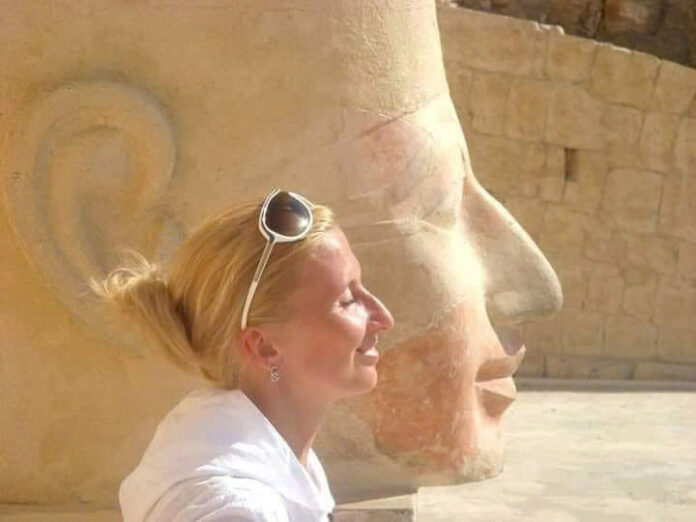The Majesty of Queen Hatshepsut

In the realm of travel, some moments stand out when the contemporary world intersects with the ancient, creating an unforgettable link to history. One such instance is captured in a photograph of a tourist smiling serenely next to the statue of Queen Hatshepsut. This image symbolizes a beautiful reflection of history and the continuity of humanity.
Queen Hatshepsut was one of ancient Egypt’s most remarkable rulers, reigning during the 18th Dynasty from around 1479 to 1458 BCE. As the longest-reigning female pharaoh, she ruled not merely as a consort or regent but as a powerful monarch. In a groundbreaking move for her time, she depicted herself as a male ruler in statues and reliefs, complete with the traditional pharaonic beard. Her reign was characterized by peace, prosperity, and monumental architectural projects that have left a lasting imprint on Egypt.

Her most renowned achievement is the mortuary temple at Deir el-Bahari, located on the west bank of the Nile, near the Valley of the Kings. This grand structure, carved into the cliffs, with its terraces and colonnades, stands as a testament to her vision and ambition, eternally enshrined in Egyptian history.
A Traveler’s Timeless Connection
The photograph of the tourist beside the colossal statue of Queen Hatshepsut at Deir el-Bahari evokes a fascinating contrast between ancient and modern. With sunglasses perched on her head and a calm, thoughtful smile, the tourist appears to forge a deep connection with history, contemplating the weight of time itself. The statue, weathered by millennia, gazes into eternity, unperturbed by the passing centuries.
This image transcends a mere travel snapshot; it embodies the universal desire to connect with those who lived long ago. In that fleeting moment, the tourist becomes part of a narrative that began over three thousand years ago, standing shoulder to shoulder with a queen who defied societal norms and left an everlasting mark on history.
The Legacy of Hatshepsut
Hatshepsut’s era was marked by significant prosperity for Egypt. She led extensive building initiatives, particularly in Thebes, and restored numerous temples and monuments. Her mortuary temple was designed to align with the rising sun and was dedicated to the god Amun, symbolizing her divine kingship. She also expanded trade routes and orchestrated wealth-building expeditions, including the famous journey to the Land of Punt, which brought back treasures that further enriched her kingdom.

However, after her death, her legacy faced near-erasure. Her successor, Thutmose III, ordered the destruction or defacement of many of her statues, likely to bolster his own legitimacy as pharaoh. Despite these efforts, Hatshepsut’s story persisted, rediscovered by modern archaeologists.
Reflection in the Sands of Time
Standing next to a statue of an ancient ruler like Hatshepsut is profoundly symbolic. Visiting such historical sites is a journey through time, conveying shared humanity and the power of art and history to transcend boundaries of time, language, and culture.

The tourist, positioned alongside this monumental figure, bridges the gap between past and present. In her quiet smile, we see more than a traveler enjoying a moment; we witness a silent acknowledgment of the awe-inspiring presence of one of history’s most extraordinary figures. Hatshepsut, a woman who ruled as king, continues to inspire us today. Her story, carved in stone, whispers to those who stand in her presence.
For modern travelers, visiting historical landmarks is not just sightseeing—it’s an opportunity to pause, reflect on the passage of time, and appreciate the enduring nature of human achievement. Queen Hatshepsut, in all her grandeur, invites us to remember that the echoes of history are always within reach. Like this tourist, we can find ourselves in the company of greatness, if only for a fleeting moment.

